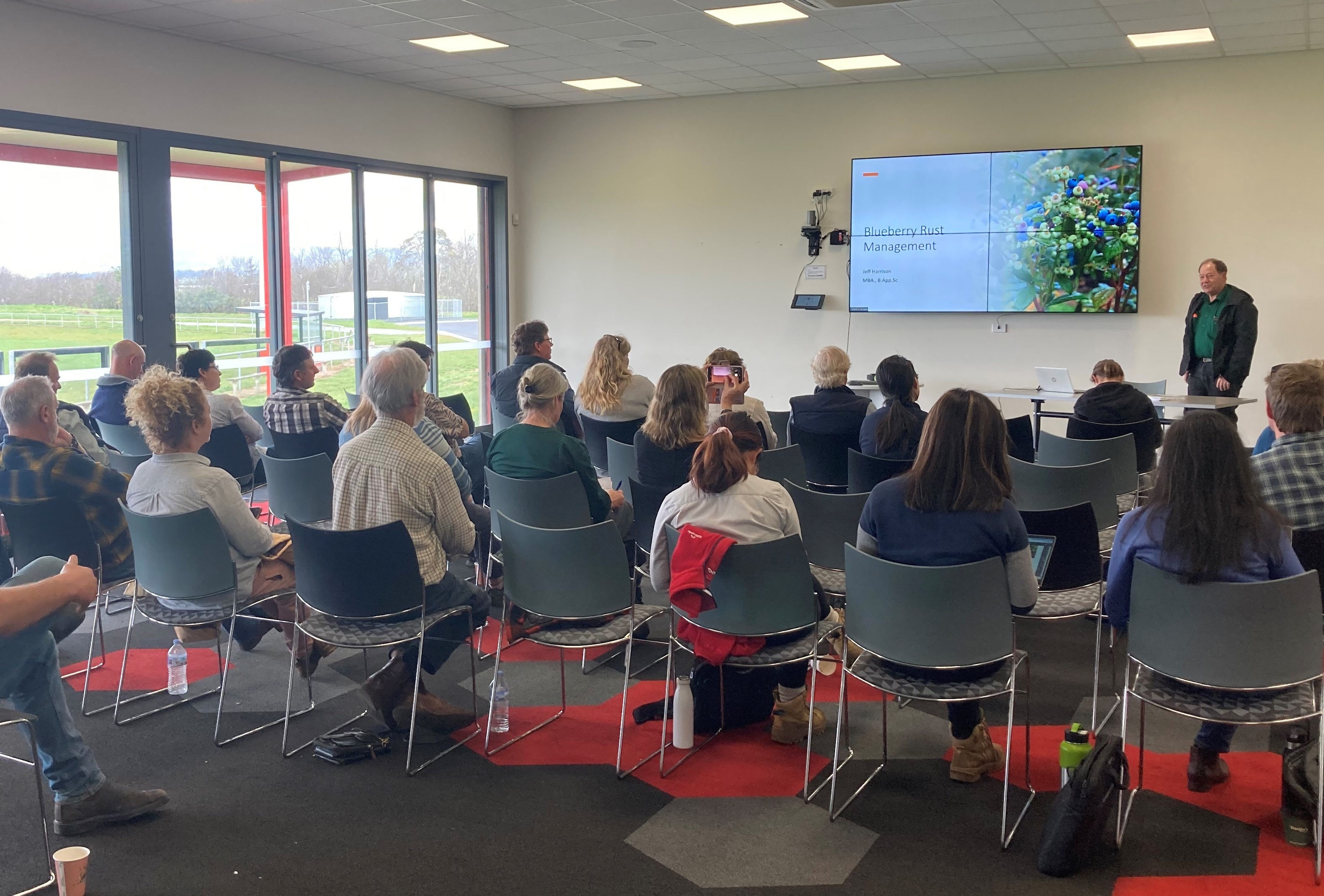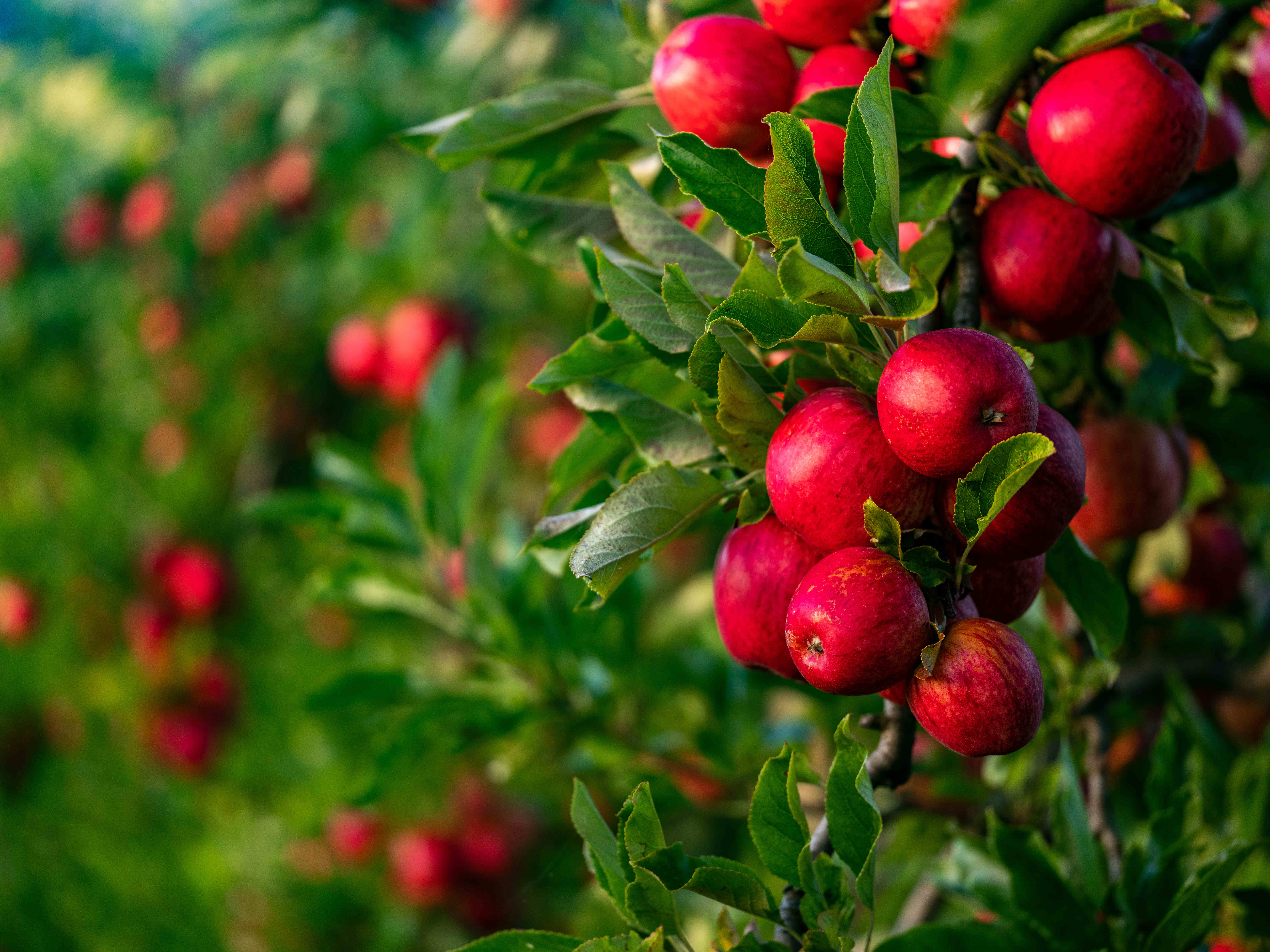Blueberry growers’ workshop
Fruit Growers Tasmania | Tuesday, 27 September 2022, 12.00pm

Fruit Growers Tasmania and Berries Australia held a very successful Blueberry growers’ workshop at Campbell Town on Friday 23 September. Blueberry rust identification and control was the main theme for the event.
Mark Salter FGT Berry IDO welcomed 32 growers and industry partners to the workshop and outlined some of the recent activities undertaken by Fruit Growers Tasmania, including the current situation with the Varroa mite outbreak in New South Wales, activities in coir and plastic recycling and the ongoing access to bumble bees for pollination.
Kara Barry firstly gave a very informative presentation on the R&D work TIA is carrying out on blueberry rust control. Outlining over the past two years, researchers at the Tasmanian Institute of Agriculture (TIA) have been working to develop science-based solutions to help Tasmania’s organic berry producers protect their crops from blueberry rust by expanding the treatment options available. Kara also outlined the latest R&D project focusing on two key issues: managing rust on semi-evergreen and evergreen cultivars where infection persists on leaves over winter; and understanding what environmental conditions are optimal for blueberry rust survival and infection and relating these to both climatic conditions in Tasmania and the cultivars grown. From this work, the project will also produce a blueberry rust infection model based on local weather data and weather forecasts to identify when there is a risk of blueberry rust infection.
Andrew Bishop from Biosecurity Tasmania then gave a presentation on the transformation of the Tasmanian blueberry industry from the regulated Blueberry Rust Containment Plan to now being unregulated. He also outlined some of the assistance measures Biosecurity Tasmania can offer including:
- Free diagnostics for suspect BBR.
- Support continued research and development by TIA.
- Provision of advice for accessing markets.
- Property inspections to meet markets.
Andrew also mentioned that growers wanting to export to South Australia must register soon. Those wanting to register should contact Tania Jenson from Biosecurity Tasmania on 0439 632 199 or email biosecurity.marketaccess@nre.tas.gov.au
After the lunch break, Melinda Simpson Berry IDO from NSW continued with a very informative presentation on blueberry rust identification and prevention. Her presentation included some very detailed slides showing what blueberry rust looks like in the field and the differences between blueberry rust and symptoms from other diseases that may be confused or look similar to blueberry rust. Melinda discussed various spray programs NSW growers are successfully using to control blueberry rust. Melinda also outlined ways to mitigate against blueberry rust in the field, including trigger points to spray, avoiding and draining wet areas in the field and not planting in shaded areas. Melinda suggested that Tasmania’s cooler climate and lower humidity may make blueberry rust easier to control than in NSW growing regions.
Jeff Harrison from Nutrien Ag Solutions wrapped up the session by speaking about spray programs for blueberry rust control and presented a list of chemicals registered for use against blueberry rust. He particularly made a point of not overusing the same chemicals and to rotate the various chemical groups so as not to build up resistance. Jeff also detailed some very interesting results with his trial work on defoliating semi and evergreen blueberries using a combination of copper and zinc sulphate. In one of the most successful trials, he was able to defoliate 95% of the leaves, the remaining leaves removed either with an air-blast sprayer or by hand. Jeff reiterated comments from some of the other presenters that most varieties grown in Tasmania are deciduous and will lose their leaves in winter, lessening the likelihood of overwintering spores reinfecting plants the following season but did comment that mycelium (fungal filaments) may persist under certain environmental conditions, particularly in buds.
The event finished at around 2.30 pm, with many growers staying on to network and chat.
Feedback for growers suggests that the day was very informative and worthwhile.
Many thanks to those who came along for the day, and a special thanks to all of the presenters.

